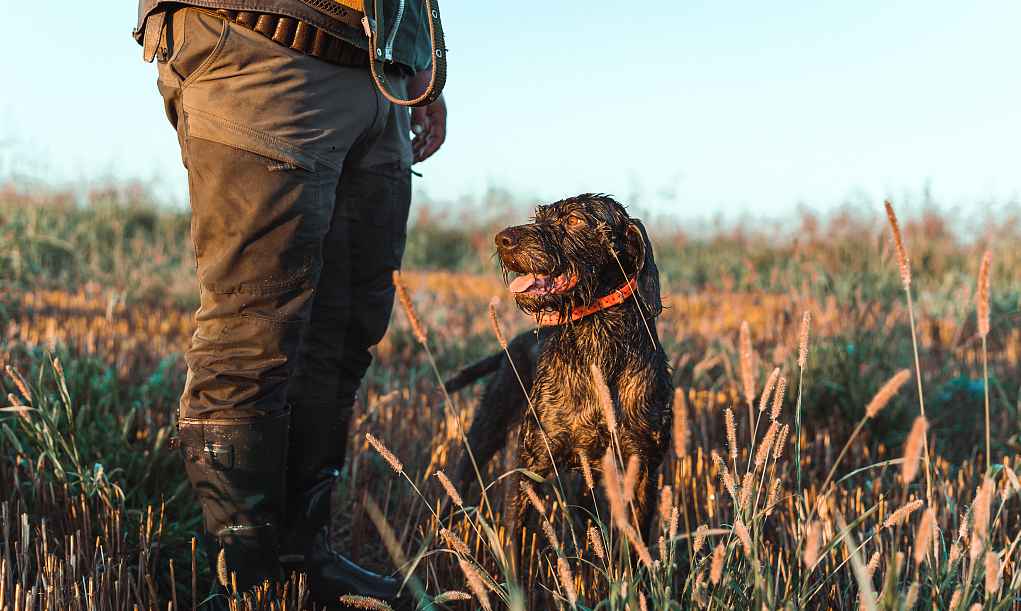When most people think of poodles, images of fluffy, elegantly groomed dogs in show rings might come to mind. However, the poodle is far more than just a pretty face. Originally bred as a hunting dog, poodles possess an impressive array of traits that make them exceptional companions for hunters. Whether you’re an avid bird hunter or looking for a versatile working dog, the poodle’s natural abilities, intelligence, and strong work ethic make it a surprisingly capable hunting partner.
In this comprehensive guide, we’ll explore the history of the poodle as a hunting dog, its unique characteristics, and how to train and care for a poodle hunting dog. By the end, you’ll understand why the poodle is one of the most underrated yet effective hunting breeds.
History of the Poodle as a Hunting Dog
Poodles have a rich history rooted in hunting. Despite their modern association with luxury and showmanship, they were originally bred to be waterfowl hunters, particularly in Europe. The Standard Poodle, the largest of the three poodle sizes (Standard, Miniature, and Toy), was specifically designed for retrieving waterfowl in marshes and lakes. The word “poodle” comes from the German word “Pudel,” which means “to splash in water,” reflecting their aquatic origins.
Poodles were valued for their intelligence, swimming ability, and retrieving skills. They were used by hunters to retrieve shot game from the water, thanks to their excellent swimming skills and waterproof coat. Their curly, dense fur helped them stay warm in cold water, while their keen noses made them skilled at locating and retrieving game.
While poodles have evolved over the years into companion animals and show dogs, their foundational hunting traits remain. Modern hunting poodles still maintain the strong retrieving instincts and endurance that were prized by hunters centuries ago.
Why the Poodle Makes a Great Hunting Dog
Poodles might not be the first breed that comes to mind when you think of hunting dogs, but they are incredibly well-suited to the task for several reasons:
1. Intelligence and Trainability
Poodles are ranked among the most intelligent dog breeds in the world, often listed in the top 10. Their ability to learn commands quickly and their eagerness to please make them highly trainable hunting dogs. Whether you need them to retrieve, point, or track, poodles are up for the task.
Their intelligence allows them to excel in complex training regimens, making them ideal for hunters who require a dog that can adapt to various hunting environments and challenges. A poodle can quickly learn the scent of a specific bird species, the rules of a particular field, and the necessary commands for retrieving game.
2. Waterfowl Retrieval Skills
As natural water dogs, poodles are exceptional at retrieving waterfowl. Their webbed feet make them strong swimmers, while their dense, curly coat is water-resistant, ensuring they stay warm in cold, wet conditions. They are agile in the water, making them excellent for retrieving ducks, geese, and other waterfowl that hunters shoot down in marshes, lakes, and rivers.
Unlike some other breeds, poodles love water, and their innate love of retrieving makes them particularly effective when hunting in aquatic environments.
3. Versatility and Adaptability
Poodles are incredibly versatile, capable of excelling in a variety of hunting situations. While they are primarily known for waterfowl hunting, poodles also work well as upland bird dogs and tracking dogs. Their sharp noses make them highly skilled at tracking game, and their agility and stamina make them useful in challenging terrains like fields, forests, and mountains.
Whether you’re hunting ducks in a flooded marsh, quail in a field, or pheasant in a wooded area, a poodle can adapt to different types of game and environments. This adaptability makes the poodle a great option for hunters who pursue a variety of game types.
4. Physical Traits for Hunting
Poodles have several physical traits that contribute to their effectiveness as hunting dogs:
- Stamina and Endurance: Poodles are athletic dogs with a lot of stamina. This is especially important when hunting in remote areas or for long periods of time. Whether you’re trekking through rugged terrain or sitting in a blind for hours, a poodle can keep up.
- Size Options: While the Standard Poodle is the most common hunting poodle, the Miniature Poodle and Toy Poodle can be useful for smaller game or for hunting in tight spaces. Standard Poodles have the size and strength to tackle larger waterfowl and upland game, while smaller poodles can be better suited for smaller game like rabbits or pheasants.
- Waterproof Coat: The poodle’s dense, curly coat helps keep them warm and dry in cold water. While regular grooming is required, their natural coat is water-resistant, preventing them from getting cold when retrieving in freezing conditions.
Training a Poodle for Hunting
Training a poodle to be a competent hunting dog requires patience, consistency, and positive reinforcement. While poodles are quick learners, they still require structured training to ensure they perform well in the field. Here are some key training tips:
1. Start Early
The earlier you begin training, the better. Poodles are most receptive to training between 8 weeks and 6 months of age. Start by introducing basic commands like “sit,” “stay,” “come,” and “fetch.” Once your poodle has mastered these, you can progress to more advanced commands.
2. Introduce Water Early
Since waterfowl hunting often involves water, it’s essential to introduce your poodle to water at a young age. Start with shallow water and gradually increase the depth as your dog becomes more comfortable. You can also use water toys or decoys to encourage your poodle to retrieve from water.
3. Retrieving Practice
Retrieving is a natural instinct for poodles, but it needs to be honed. Start by tossing a toy or a bumper (a soft, weighted object) and having your dog retrieve it. Gradually increase the difficulty by throwing the object further or incorporating it into real hunting scenarios.
4. Scent Training
To train your poodle to track and retrieve specific types of game, scent training is a must. Use bird feathers, scent trails, or even a piece of game meat to get your poodle familiar with the scent of the animal you’ll be hunting. Allow your dog to follow the scent and reward them when they successfully retrieve the object.
5. Use Positive Reinforcement
Poodles respond well to positive reinforcement, such as treats and praise. Make sure to reward your dog for successful performance, which will motivate them to continue learning. Avoid harsh punishment, as poodles are sensitive dogs and respond better to encouragement.
Health and Care for Poodle Hunting Dogs
To ensure your poodle remains in top shape for hunting, proper care and maintenance are necessary:
- Exercise: Poodles are active dogs and need regular exercise to stay fit. Take them on long walks, runs, or hikes to keep their stamina up. If you’re planning a hunt, make sure your poodle is physically prepared for the activity.
- Grooming: Poodles require regular grooming to maintain their curly coat. After hunting in wet or muddy conditions, thoroughly dry and brush your dog to prevent matting and skin infections. A well-maintained coat also helps in waterfowl retrieval.
- Veterinary Care: Keep up with regular vet checkups to ensure your poodle is healthy and free of parasites. Given that poodles can be prone to joint issues like hip dysplasia, regular checkups are vital for early detection and prevention.
Conclusion: The Poodle as a Hunting Dog
While the poodle may not be the first breed that comes to mind for hunting, it is undoubtedly a highly capable and versatile hunting companion. Their intelligence, stamina, love of water, and adaptability make them ideal for various hunting situations, from waterfowl retrieval to upland game hunting. With proper training and care, a poodle can become a loyal and effective partner in the field, offering hunters an experience that’s as rewarding as it is successful.
So, the next time you’re looking for a hunting dog, don’t overlook the poodle. Its natural instincts and working abilities could surprise you—and make for a fantastic hunting companion.


